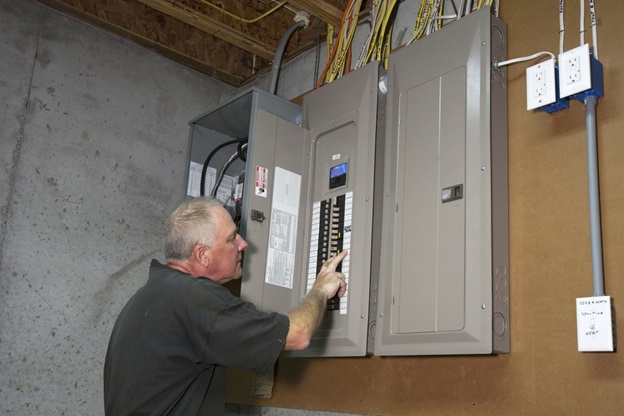A circuit breaker is an important component of any electrical system. It serves a crucial purpose, keeping systems running as they should and preventing faults from occurring. But what is it, exactly?
If you’re not familiar, don’t worry. This guide will break down the importance of a circuit breaker, what exactly it is, and the different types of circuit breakers you’ll be likely to encounter. Read on to find out more about this electrical feature and why it’s important.
What Is a Circuit Breaker?
A circuit breaker is a safety feature built into electrical systems. Every building, be it a residential home or commercial space, will have a circuit breaker in the fuse box. A circuit breaker’s purpose is to prevent electrical systems from overheating, catching fire, or experiencing a power surge.
A circuit breaker is triggered when a system overloads or overheats. When this happens, a switch is tripped and the circuit breaker cuts off the power. It does this by interrupting the flow of electrical current when it exceeds a predetermined state.
This is a very basic explanation of the way in which a circuit breaker works. Click here for a more detailed description of how circuit breakers work.
Different Types of Circuit Breakers
Now that we’ve discussed how a circuit breaker works, we can take a look at some of the different types of circuit breakers that exist. There are three main types of circuit breakers, each with a slightly different purpose. These are standard circuit breakers, ground fault circuit interrupter circuit breakers, and arc fault circuit interrupter circuit breakers.
Standard Circuit Breakers
This is the most common and most simple of the three main types of circuit breakers. A standard circuit breaker is used for monitoring the flow of electricity within a system and cutting off the current during overloads or short circuits. This is the type of circuit breaker you most likely have in your fuse box.
Ground Fault Circuit Interrupter Circuit Breakers
Ground fault circuit interrupter (or GFCI) circuit breakers are often used in areas where electricity systems can get wet. This could be somewhere such as a bathroom, kitchen, or laundry room.
The GFCI circuit breaker protects against a line-to-ground fault. This is when a hazardous electrical path forms between an electrical current and a grounded element.
Arc Fault Circuit Interrupter Circuit Breakers
Arc fault circuit interrupter (or AFCI) circuit breakers are designed to detect and respond to arcing within electrical wiring. Arcing refers to when an electrical cord is damaged or its covering becomes too thin. This can present a risk of fire.
Circuit Breaker 101
Hopefully, this guide has helped to clarify the differences between the different types of circuit breakers. This is important and helpful information, and you never know when it might come in handy. If you’ve found this guide helpful, don’t forget the take a look at some of our other home-related content.








